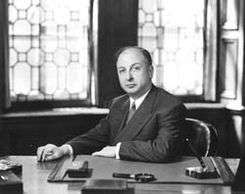Samuel Bronfman
| Samuel Bronfman | |
|---|---|
 | |
| Born |
February 27, 1889 Soroki, Bessarabia (now Moldova) |
| Died |
July 10, 1971 (aged 82) Montreal, Quebec, Canada |
| Occupation | Founder of Distillers Corporation Ltd. |
| Spouse(s) | Saidye Rosner Bronfman |
| Children |
Aileen Mindel "Minda" Bronfman de Gunzburg Phyllis Lambert Edgar Miles Bronfman Charles Rosner Bronfman |
Samuel Bronfman, CC (February 27, 1889 – July 10, 1971) was a Canadian businessman and philanthropist. He founded Distillers Corporation Limited, and is a member of the Canadian Jewish Bronfman family.
Biography
Samuel Bronfman was born in Soroki, Bessarabia, then part of Imperial Russia, one of eight children of Mindel and Yechiel Bronfman. He and his parents were Jewish refugees of Czarist Russia's anti-Semitic pogroms,[1] who migrated to Wapella, Saskatchewan. They soon moved to Brandon, Manitoba. A wealthy family, they were accompanied by their rabbi and two servants. Soon Yechiel learned that tobacco farming, which had made him a wealthy man in his homeland, was incompatible with the cold Canadian climate of that region. Yechiel was forced to work as a laborer for the Canadian Northern Railway, and after a short time moved to a better job in a sawmill. Yechiel and his sons then started making a good living selling firewood and began a trade in frozen whitefish to earn a winter income. Eventually they turned to trading horses, a venture through which they became involved in the hotel and bar business.[2]
In 1903, the family bought a hotel business, and Samuel, noting that much of the profit was in alcoholic beverages, set up shop as a liquor distributor. He founded the Distillers Corporation in Montreal in 1924, specializing in cheap whiskey, and concurrently taking advantage of the U.S. prohibition on alcoholic beverages. The Bronfmans sold liquor to the northern cities of the U.S. such as Boston, New York and Chicago during the Prohibition era, while operating from the perimeters of Montreal, Quebec where alcohol production was legal.[3]
On June 21, 1922, Bronfman married Saidye Rosner (1897 - July 7, 1995), with whom he had four children: Aileen Mindel "Minda" Bronfman de Gunzburg (1925–1986), Phyllis Lambert (born January 24, 1927), Edgar Miles Bronfman (June 20, 1929 - December 21, 2013[4]), Charles Rosner Bronfman (born June 27, 1931).
Business career
Bronfman's Distillers Corporation acquired Joseph E. Seagram & Sons of Waterloo, Ontario, from the heirs of Joseph Seagram in 1928. Bronfman eventually built an empire based on the appeal of brand names developed previously by Seagram—including Calvert, Dewars, and Seven Crown—to higher-level consumers. His sales were boosted during the United States' abortive experiment with prohibition, and he was apparently able to do so while staying within the confines of both Canadian law, where prohibition laws had been previously repealed, and American law.
His renamed company, Seagram Co. Ltd., became an international distributor of alcoholic beverages, and a diversified conglomerate which included an entertainment branch.
Because of changes to US tax law in the Lyndon Johnson administration, it became advantageous for Bronfman to purchase an oil company,[5] which he did with the purchase of Texas Pacific Coal and Oil Company in 1963 for $50 million. In 1980, the Bronfman heirs sold the Texas Pacific Oil holdings to Sun Oil Co. for $2.3 billion.[6]
The Seagram assets have since been acquired by other companies, notably The Coca-Cola Company, Diageo, and Pernod Ricard.
Philanthropy, awards and commemoration
In 1952, he established the Samuel and Sadie Bronfman Family Foundation, one of Canada's major private granting foundations. Bronfman was President of the Canadian Jewish Congress from 1939 to 1962, and he was made a Companion of the Order of Canada in 1967.[7] In 1971, he helped to establish the Bronfman Building at McGill University, which houses the Desautels Faculty of Management. The building was named in his honour as appreciation for his donation to the university. The Bronfman family has continued its support of the university; in 1993 they created the McGill Institute for the Study of Canada, and in 2002 donated the Seagram Building on Sherbrooke St. to McGill.[8]
The Bronfman Archaeology Wing of the Israel Museum in Jerusalem, Israel, is named for Bronfman and his wife.[9]
In fiction
Mordecai Richler's 1989 novel Solomon Gursky Was Here is largely based on the life of Samuel Bronfman.
See also
References
- ↑ Samuel Bronfman: The Life and Times of Seagram's Mr. Sam (Hardcover, 1992); Author: Michael R. Marrus
- ↑ The Seagram Company Ltd. - Company Profile, Information, Business Description, History, Background Information on The Seagram Company Ltd
- ↑ Daniel Okrent, Last Call: The Rise and Fall of Prohibition pp.146-158 (2010; Simon & Schuster) ISBN 978-0-7432-7702-0
- ↑ http://www.legacy.com/obituaries/buffalonews/obituary.aspx?n=edgar-m-bronfman-sr&pid=168708882
- ↑ Crossfire: The Plot That Killed Kennedy; Jim Marrs; pp. 276-277; ISBN 978-0-88184-648-5
- ↑ Samuel Bronfman - The Life and Times of Seagram’s Mr. Sam; Michael R. Marrus, published by Brandeis University Press of New England, copyright 1991, ISBN 0-87451-571-8; pages 372-373
- ↑ Office of the Governor General of Canada. Order of Canada citation. Queen's Printer for Canada. Retrieved 24 May 2010
- ↑ Archived May 2, 2006 at the Wayback Machine
- ↑ Samuel and Saidye Bronfman Archaeology Wing
Further reading
- Christopher G. Curtis, "Bronfman Family", The Canadian Encyclopedia: Year 2000 Edition (1999) - ISBN 0-7710-2099-6
- Michael R. Marrus, Mr. Sam: The Life and Times of Samuel Bronfman (1991) - ISBN 0-87451-571-8
- Peter C. Newman, Bronfman Dynasty: The Rothschilds of the New World (1978; U.S. title: King of the Castle: The Making of a Dynasty) ISBN 0-7710-6758-5
External links
| Non-profit organization positions | ||
|---|---|---|
| Preceded by Samuel William Jacobs |
President of the Canadian Jewish Congress 1939–1962 |
Succeeded by Michael Garber |
|